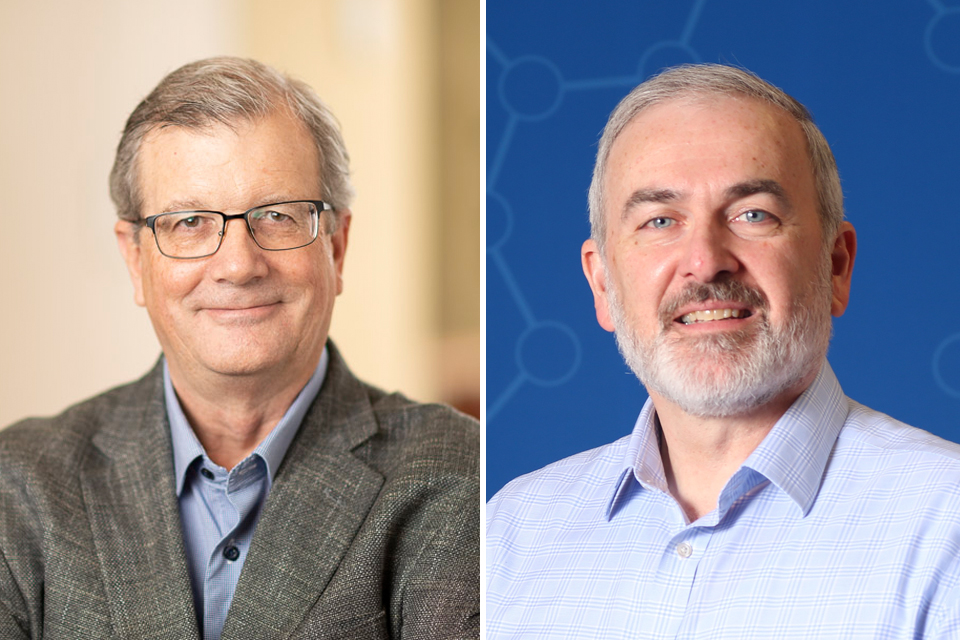Gabbay Award given to pioneering scientists Frank Bennett and Adrian Krainer
The two researchers were recognized for their work developing a therapy for the neuromuscular disease spinal muscular atrophy.
 Courtesy photos
Courtesy photosFrank Bennett and Adrian Krainer
The 23rd Jacob and Louise Gabbay Award has been given to two scientists whose breakthrough work led to a new treatment for a debilitating genetic disorder that afflicts mainly children.
Adrian Krainer, the St. Giles Foundation Professor at Cold Spring Harbor Laboratory, and Frank Bennett, executive vice president and chief scientific officer at the California-based pharmaceutical company Ionis Pharmaceuticals, collaborated on the research that led to Spinraza, a therapy for spinal muscular atrophy (SMA).
SMA is a rare neuromuscular disorder that results in the loss of motor neurons and muscle weakening, leaving patients unable to sit or walk and requiring ventilation. Though it can appear at any age, it typically emerges shortly after birth, affecting approximately 1 in 11,000 babies born worldwide.
Until Krainer and Bennett's work, the children with the most common and severe form of the disease often died before age 2, with the disease thought to be untreatable.
"The Gabbay Award is given in recognition of scientists whose work has outstanding scientific content and significant practical applications in the biomedical sciences," said professor of biochemistry and chemistry emerita Dagmar Ringe, who administers the prize.
"Dr. Krainer’s work is innovative and has contributed to our understanding of RNA splicing, leading to his working out the mechanism of the defect in spinal muscular atrophy (SMA) and then pioneering a groundbreaking approach to ameliorating that defect: the development of a therapy for spinal muscular atrophy.
“Dr. Bennett is recognized for his important contributions to the development of antisense oligonucleotide technology and its application to neurological diseases and modulating splicing to correct severe genetic diseases."
Krainer, who is also the deputy director of research at Cold Spring Harbor Laboratory Cancer Center, and Bennett collaborated to discover their therapy for spinal muscular atrophy in a close academic-industry collaboration. Ionis developed the drug in partnership with the pharmaceutical company Biogen.
It required Krainer’s lab’s analysis of the splicing defect in SMN2, the gene responsible for the disease, before a strategy for correcting the defect in SMN2 was devised and implemented.
The resulting therapeutic, Spinraza (nusinersen), has been extraordinarily successful and is currently relied upon by more than 11,000 SMA patients.
Early in 1998, the trustees of the Jacob and Louise Gabbay Foundation decided to establish a major new award in basic and applied biomedical sciences. The foundation felt that existing scientific awards tended to honor people who were already well-recognized or to focus on work that had its primary impact in traditional basic research fields.
Yet the history of science suggests that most scientific revolutions are sparked by advances in practical areas such as instrumentation and techniques or through entrepreneurial endeavors.
The foundation, therefore, created the Jacob Heskel Gabbay Award in Biotechnology and Medicine to recognize, as early as possible in their careers, scientists in academia, medicine or industry whose work had both outstanding scientific content and significant practical consequences in the biomedical sciences.
The award was renamed the Jacob and Louise Gabbay Award in Biotechnology and Medicine in 2016 to honor Jacob's wife, Louise Gabbay, who was instrumental in founding the award. Because of their long association with the university, the trustees of the foundation asked the Rosenstiel Basic Medical Sciences Research Center at Brandeis to administer the award.
The annual award consists of a $30,000 cash prize (to be shared in the case of multiple winners) and a medallion.
Krainer and Bennett will be honored at Brandeis and present lectures on their work on Thursday, October 21. It has yet to be determined whether the event will be on-campus or held remotely by videoconference.
Categories: Research, Science and Technology





